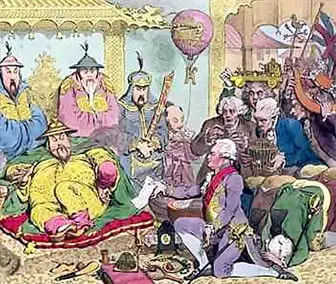To accept the authority of another; to act in a subservient manner.
To kowtow to
What's the meaning of the phrase 'To kowtow to'?
What's the origin of the phrase 'To kowtow to'?
I’ve understood the meaning of ‘to kowtow to’ for as long as I can remember but it is only recently that I came to wonder how the expression originated. ‘Kowtow’ (and, in case you’ve not come across it before, kowtow is pronounced to rhyme with ‘cow’ + ‘how’) is an odd word and, for no better reason than the sound of it, I thought it might have something to do with cows. Apparently not.
‘Kowtow’ sounds odd to our ears because it is a Chinese word. To kowtow is to kneel and touch the ground with the forehead as an act of worship or submission. The practice first came to the attention of the English-speaking world late in the 18th century, when westerners began to visit China. The word is an Anglicised version of the Chinese ‘kētóu’, which derives from ‘kē’ (knock’)+ ‘tóu’ (head).
The British explorer Sir John Barrow was well placed to observe kowtowing at first hand. In 1792 he was appointed as an aide to Viscount Macartney, the British ambassador in Peking. Barrow subsequently wrote Travels in China, 1804, in which he was the first to explain kowtowing to the west:
The Chinese were determined they should be kept in the constant practice of the koo-too, or ceremony of genuflexion and prostration.
There were several degrees of kowtowing, depending on the difference in rank of the participants, the highest level requiring a full face down prostrate pose with arms held wide.
Macartney was given his £15,000 a year job as ambassador to head a trade mission to negotiate a deal between Britain and China. In 1793 he was presented to Emperor Qianlong, or ‘son of heaven’ as he preferred to be called, but the viscount pointedly refused to perform the obligatory kowtow. To the disbelief of the aghast Chinese court, Macartney would only go down on one knee, as he would to the British ruler. This event was recorded by the satirical cartoonist Gillray. Qianlong left in a huff, the trade mission was abandoned and Macartney was sacked.
Prices in the UK have increased about 500 times since 1793. Macartney might have felt that he had retained his dignity but, had he known it was going to cost him a £7.5 million a year job, he might have thought that a quick kowtow would have been prudent.
The history of “To kowtow to” in printed materials
Trend of to kowtow to in printed material over time
Browse more Phrases
About the Author

Phrases & Meanings
A-Z
A B C D E F G H I J K L M N O P Q R S T UV W XYZ
Categories
American Animals Australian Bible Body Colour Conflict Death Devil Dogs Emotions Euphemism Family Fashion Food French Horses ‘Jack’ Luck Money Military Music Names Nature Nautical Numbers Politics Religion Shakespeare Stupidity Entertainment Weather Women Work
How did we do?
Have you spotted something that needs updated on this page? We review all feedback we receive to ensure that we provide the most accurate and up to date information on phrases.
